Super Rugby Women’s Grand Final teams: all roads lead to Ballymore, Emily Robinson reaches milestone
And then, there were two. The NSW Waratahs and Fijian Drua will meet at Ballymore to decide who lifts the Super Rugby Women's trophy,…
The first World Cup in 1987 brought 16 teams together from all around the globe, with every continent represented, in an entirely unprecedented festival of international rugby in what was still, technically, the amateur era with its four-point tries.
Principal hosts New Zealand were assisted by Australia. South Africa could not participate due to its political situation. It was nonetheless a resounding success. No team was disgraced.
New Zealand registered the highest score, 74-13 v Fiji, and margin, 70-6 v Italy. Highlights included Richard Tsimba’s brace for Zimbabwe in a 20-21 loss to Romania, America’s hard-fought win over Japan and Fiji’s surprise thumping of Hugo Porta’s Argentina. Despite losing to Italy, Fiji got through to the quarter-finals.
The semi-finals were memorable for Serge Blanco’s late winner for France over Australia in Sydney and New Zealand’s record 49-6 thumping of Wales. New Zealand were irrepressible throughout the tournament, and duly won the final, 29-9.
The second World Cup in 1991 was hosted by Britain, France and Ireland. There was only one debutant, Samoa, who supplanted Tonga, and it was the Samoans who would set this tournament on fire, stunning Wales and thumping Argentina to reach the quarter-finals at the expense of both.
Similarly impressive were Canada, who overcame Fiji and Romania to book their place in the last eight against New Zealand.
Other memorable performances included Japan’s 52-8 demolition of Zimbabwe, Romania’s upset win over Fiji and Italy’s much improved effort against New Zealand in losing 21-31.
Australia needed a last minute try from Michael Lynagh to edge Ireland in the quarter-finals, but David Campese magic saw them eliminate hitherto unbeaten New Zealand in the semi-finals. Australia beat England 12-6 in the final.
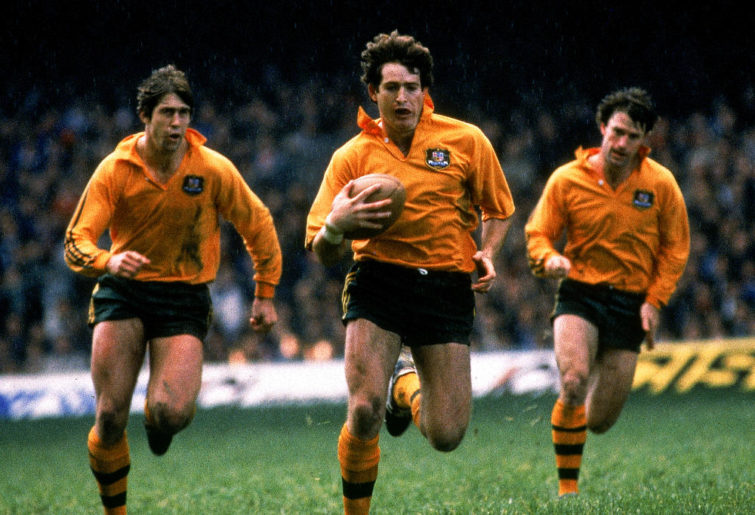
David Campese of the Wallabies (Photo by Getty Images)
The third World Cup in 1995 was hosted solely by South Africa, where Apartheid was over. In came South Africa, Tonga and Ivory Coast, out went Fiji, Zimbabwe and the US.
Tries had been increased to five points. South Africa beat Australia on debut and Samoa again reached the quarter-finals with wins over Argentina and Italy. But the early stages were memorable mostly for Jonah Lomu’s storming runs on the wing for New Zealand, scoring four tries and creating even more.
Even without Lomu, New Zealand racked up the the event’s first ton, 145-17 v Japan with Marc Ellis running in six tries.
Wales were again eliminated, while Ivory Coast had an unhappy time, losing 0-89 to Scotland on debut, before real tragedy struck when winger Max Brito was paralysed during the loss to Tonga.
England flyhalf Rob Andrew was knighted after his winning drop-goal against Australia in the quarter-finals. But England were then taken apart by Lomu, who charged across for four tries in the semi-finals.
South Africa held on against France in torrential rain in the other semifinal. In an enthralling finale, though one which was devoid of tries, Joel Stransky kicked the winning drop-goal for the hosts deep into extra time. President Nelson Mandela was on hand to award the trophy to his countrymen.
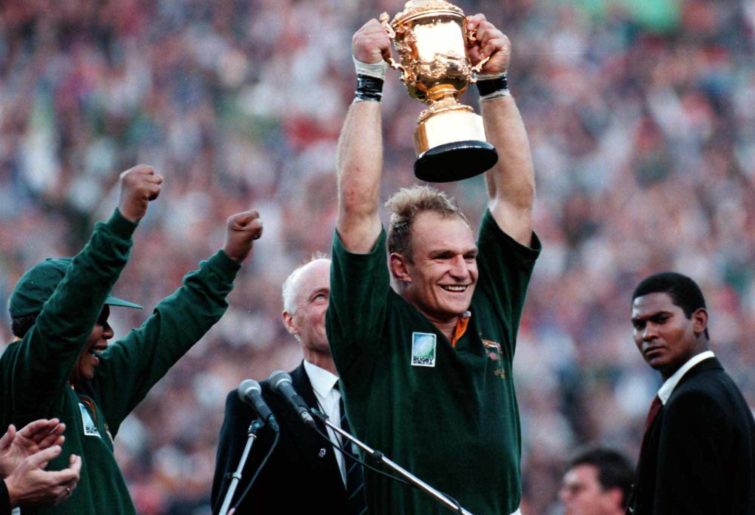
South Arican President Nelson Mandela, left, cheers as Springbok Rugby captain Francois Pienaar holds the trophy high
The fourth World Cup in 1999, the first of the professional era, returned to Britain, France and Ireland.
It was expanded to 20 teams, with five groups of four leading to three repechage playoffs for the quarter-finals. In came Fiji, the US, Uruguay, Spain and Namibia, out went the Ivory Coast.
Samoa again stunned Wales, though the hosts returned to the quarter-finals nonetheless. New Zealand and England registered tons v Italy and Tonga, respectively, while Italy’s misery on the eve of their Six Nations debut was compounded by defeat to Tonga.
England and Scotland eliminated Fiji and Samoa in the repechage playoffs, while Argentina held on against Ireland to reach the last eight for the first time. Jannie De Beer kicked a record five drop-goals to help South Africa thump England in the quarter-finals.
The semi-finals were full of drama, with Stephen Larkham’s drop-goal clinching victory for Australia deep into extra-time against hitherto unbeaten South Africa, and France coming from behind to shock New Zealand 43-31, despite a Lomu brace.
Australia cruised to a 35-12 win over France in the final to become the first two-time champion.
[caption id="attachment_602145" align="alignleft" width="755"]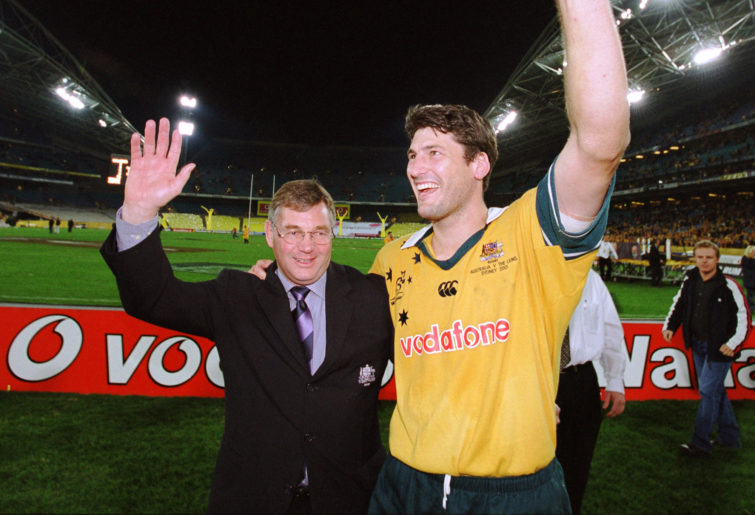 Rod MacQueen celebrates with John Eales (Dave Rogers /Allsport)
Rod MacQueen celebrates with John Eales (Dave Rogers /Allsport)
The fifth World Cup in 2003, the first of the new millennium, was held entirely in Australia after New Zealand were axed as co-hosts.
The format was changed to four groups of five, removing the repechage playoffs. The solitary debutant was Georgia, who have qualified for every tournament since. Out went Spain.
The group stages were predictable, with only Fiji and Tonga threatening the established order in narrow losses to Scotland and Wales, respectively.
The hosts, having put 90 points on Romania, broke records with a 142-0 annihilation of Namibia, and England got a ton v Uruguay. The only upset of the tournament was Australia’s 22-10 victory over perennial favourites New Zealand in the semi-finals.
In a riveting final, league converts Lote Tuqiri and Jason Robinson touched down for Australia and England, respectively, before Jonny Wilkinson’s drop-goal deep into extra time saw a northern hemisphere team prevail for the first and only time.
The sixth World Cup in 2007 was staged in France with assistance from Wales and Scotland (the third time these three nations had been involved as hosts).
In came Portugal, out went Uruguay, giving Europe 9/20 teams. In contrast to the previous edition, there were upsets aplenty, with Argentina stunning France in the opener then comfortably eliminating Ireland to top their group.
Fiji held on for a 38-34 win over Wales, who failed to make the quarter-finals for the third time.
Tonga pushed South Africa all the way in a 25-30 loss, South Africa in turn demolished the defending champions 36-0, Georgia gave Ireland a huge fright – before grabbing their first tournament win, 30-0 v Namibia – New Zealand registered a ton against Portugal, and Scotland scraped through against Six Nations nemesis Italy.
The drama continued in the quarter-finals, with Argentina making the semi-finals for the first time after a tense win over Scotland, and New Zealand failing to reach that stage for the first and only time after an 18-20 defeat to France.
A much-improved England overcame the hosts in the semi-finals but succumbed to South Africa in another tryless final, a result which saw the winners join Australia as two-time champions.
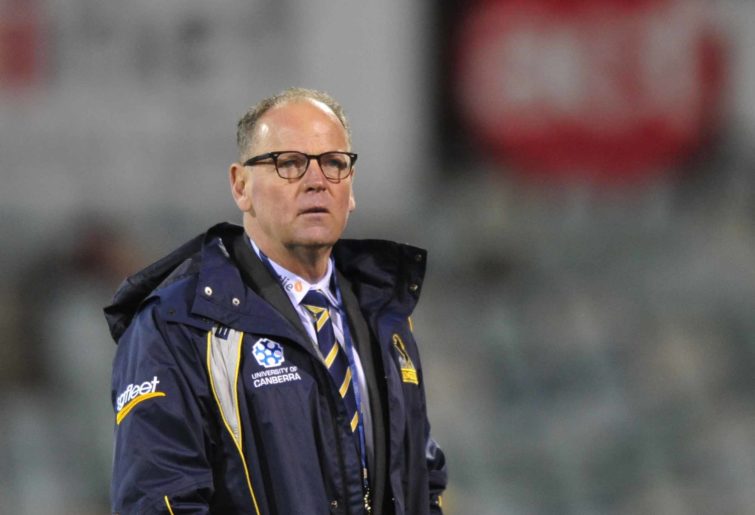
Jake White coached the Springboks to the 2007 World Cup. (AAP Image/Lukas Coch)
The seventh World Cup in 2011 was staged solely in NZ, though the nation’s second biggest stadium was ruled out after a devastating earthquake had killed 185 people earlier that year.
Again there was only one debutant, Russia, supplanting Portugal. Tonga recorded an astonishing upset over France in the group stages, though France went through regardless, with Tonga missing out due to a defeat by Canada.
Argentina returned to the last eight courtesy of a 13-12 win over Scotland, while Wales hammered a Fijian side unable to bring its military players owing to a political coup, 66-0.
The US beat Russia 13-6 in a battle of the old Cold War foes, for its first win since 1987. History repeated itself in the semi-finals, with the same four teams lining up in the semi-finals as in 1987.
Wales came agonisingly close to their first final but were pipped 9-8 by France, a red card to Sam Warburton not helping their cause. In a similarly tense final the hosts held on for an 8-7 win over luckless France to join Australia and South Africa as two-time champions.
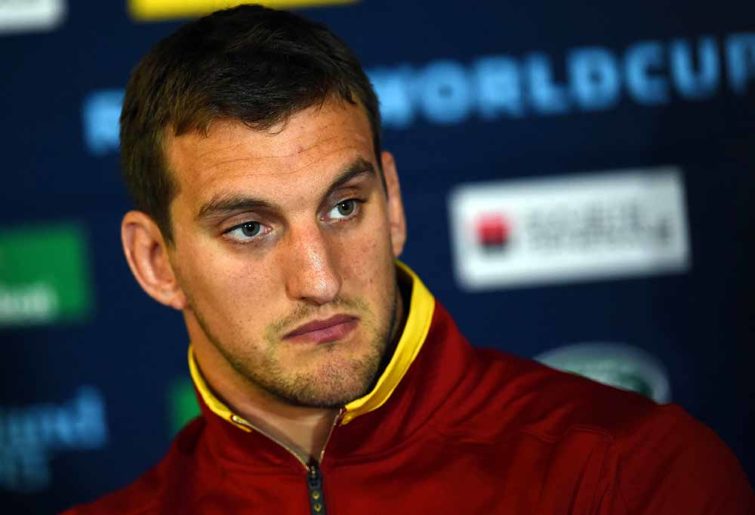
Sam Warburton’s red card was not deserved. (AFP PHOTO / LOIC VENANCE)
The eighth World Cup in 2015 was again staged in Britain; England as official hosts. The group stages were notable for two remarkable outcomes. The first came when Japan stunned double champions South Africa with a last-minute try for just their second win at the tournament ever; the second when the host nation failed to progress after losses to both Wales and Australia.
Japan also went on to beat Samoa and the US but defeat to Scotland saw them miss out on the final eight. The quarter-finals resulted in an unprecedented clean sweep for the southern hemisphere over their northern counterparts, New Zealand running riot against France, South Africa and Australia edging Wales and Scotland, respectively, and Argentina returning to the semi-finals with an emphatic win over highly-rated Ireland.
The All Blacks were given their toughest work-out in a two-point win over the Springboks in the semi-finals but were in control most of the way against the Wallabies in the final, clinching a record third title with a 34-17 victory.